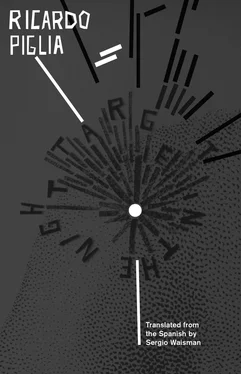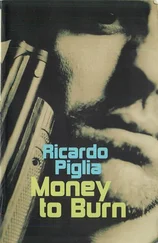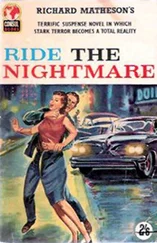“Join me for something to eat?” Croce asked.
“Yes, sure,” Renzi said. “It’ll be a pleasure.”
He sat at the table with Croce and ordered a strip of short ribs and a lettuce and tomato salad, without onions.
“This store and tavern was the first thing built in town. The migrant laborers used to eat here at harvest time.” Renzi realized right away that the Inspector needed company. “When one is an inspector one starts to believe that one has managed to reduce the scale of death down to a personal dimension. And when I say death I mean murder. Somebody can be killed by accident,” Croce said, “but you can’t murder someone by accident. If Mrs. X hadn’t walked back home yesterday, for example, and if she hadn’t turned at a certain corner, could she have avoided being murdered? She might have died anyway, that’s true, but murdered? If death isn’t the intended goal, it’s not murder. That’s why there’s always a decision, and a motive. Not just a cause, but a motive.” He stopped. “Which is also why a pure crime is rare. If there’s no motive, it’s an enigma: we have the dead body, we have the suspects, but we don’t have the cause. Or the cause doesn’t correspond to the execution of the murder. This seems to be the case now. We have the dead body and we have a suspect.” He paused. “What we call motivation could be an unseen meaning, not because it’s a mystery, but because the network of determinations is too vast. We have to concentrate, synthesize, find the fixed point. We have to isolate an item of fact and create a closed field, otherwise we’ll never be able to solve the enigma.”
Drawing small figures on the tablecloth, the Inspector reconstructed the facts for himself, but also for Renzi. He always needed someone to speak to, someone to help him break out of his internal discourse, the words that went around and around in his head like a tune. When he spoke with someone he was forced to choose certain thoughts, it was impossible to say everything, he always tried to have his interlocutor reflect with him and arrive at his own conclusions even before him. That was how he could trust his reasoning, because someone else would have thought it with him. In this he was like everyone who was too intelligent — Auguste Dupin, Sherlock Holmes — and needed an assistant to think with him, and to keep him from falling into delirium.
“For Cueto the criminal is Yoshio and the motive is jealousy. A private crime, no one else is implicated. Closed case,” Renzi said.
“It seems to me that Cueto is always saying that things that appear to be different are really the same, while I’m interested in showing that things that appear to be the same are really different. I’ll teach them differences. 19 See?” he asked. “It’s a duck, but if you look at it like this, instead, it’s a rabbit.” Croce drew the outline of the duck-rabbit. “What does it mean to see something such as it is? It’s not easy.” He looked down at the drawing he had sketched on the tablecloth. “A rabbit and a duck…

“Things are what we know them to be before we see them.” Renzi didn’t understand where the Inspector was going. “We see things according to how we interpret them. It’s called foresight: to know beforehand, to be forewarned. 20Out in the country, you follow the trail of a calf, you see the footprints on the dry earth, you know the animal is tired because the tracks are light, you orient yourself because the birds land to peck on the trail. You can’t just randomly look for footprints, the tracker must first know what he’s looking for: human, dog, puma. Then he can see. I’m like that too. You have to have a base first, only then can you can make inferences and deductions. That’s why you see what you know,” he pointed out, “and why you can’t see what you don’t know. Discovering something is seeing what no one else has perceived yet in another way. That’s the point.” Strange, Renzi thought, but he’s right. “On the other hand, if I don’t think of him as the criminal, his actions, his behavior, they don’t make sense.” He paused, thinking. “Understanding,” he said when he snapped out of it, “is not discovering facts, or extracting logical inferences, and even less constructing theories. Understanding is simply a matter of adopting the right point of view to perceive reality. A sick man doesn’t see the same world that a healthy man sees,” Croce said, losing himself in his thoughts again, but snapping right out of it this time. “A sad man doesn’t see the same world as a guy who’s happy. Likewise, a policeman doesn’t see the same reality as a journalist — begging your pardon,” he added, smiling. “I know reporters write with the solid intention of learning about the matter later.” He looked at him with a smile. Although he agreed, Renzi couldn’t respond, he had food in his mouth. “It’s like a game of chess, you have to wait for your opponent to make a move. Cueto wants to close the case, everyone in town wants the case to be closed, and I’m waiting for the evidence to break. I already have it, I know what happened, I saw it, but I can’t prove it yet. Look.” Renzi moved closer to see what Croce was looking at. It was a group of people on a horse in a photograph from the newspaper. Croce had circled the figure of a jockey. “You know what a simile is.”
Renzi looked at him.
“It’s all about distinguishing what something is from what it appears to be,” Croce continued. “ Noticing something means stopping there, in front of it.” Croce stopped, as if he were waiting for something. The telephone rang then. Madariaga answered, looked at Croce, and made a cranking motion with his hand.
“A call from the police station in Tapalqué,” he said.
“Aha,” Croce said. “Good.” He got up and walked to the counter.
Renzi saw him nod his head yes, serious, and move his hand in the air as if the person on the telephone could see him.
“And when was this?
“Is there anyone with him?
“I’m on my way. Thanks, Leoni.”
Croce went up to the counter. “Add the dinner to my tab, my Basque friend,” he said to Madariaga, and started toward the exit. He stopped at the table where Renzi was still sitting.
“There’s been news. You can come along if you’d like.”
“Perfect. I’m taking this with me,” Renzi said, grabbing the paper with the drawing.
Night would have to finally fall before Sofía would clear up for him—“it’s an expression”—the story of her family, between their comings and goings to the mirror on the table in the living room with the white lines, which gave them both a few long minutes of exhilaration and clarity, of instant happiness, followed by a sort of dark grief which in the end Sofía valorized by saying that it was only during those moments of coming down—“in the comedown”—that it was possible to be sincere and tell the truth, leaning over the glass table with a rolled-up bill to snort the uncertain whiteness of the salt of life.
“My father,” Sofía said, “always thought that his sons would marry country girls from good families with good last names. He sent my brother Lucio to study engineering in La Plata, because that’s what he had done, and when he got there Lucio rented a room in a boarding house on Diagonal 80 which was run by a chronic student, a guy named Guerra. At the boarding house, on Fridays, they’d have this young woman come for the weekend, she rode over on a moped, the Vespa girl, they called her, she was really nice, an architecture student, living the life, as they say. Bimba, is the name she went by. A fun girl, she’d get there on Friday and stay through Sunday, she’d sleep with the six students who lived in the house, one at a time, of course, and sometimes she’d cook them meals or sit with them and drink mate, play cards, after doing them all.
Читать дальше













